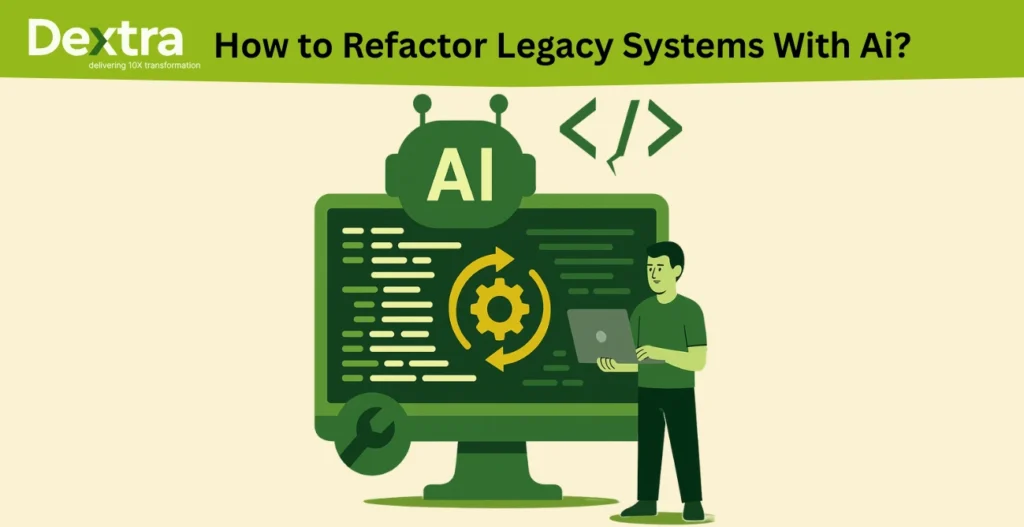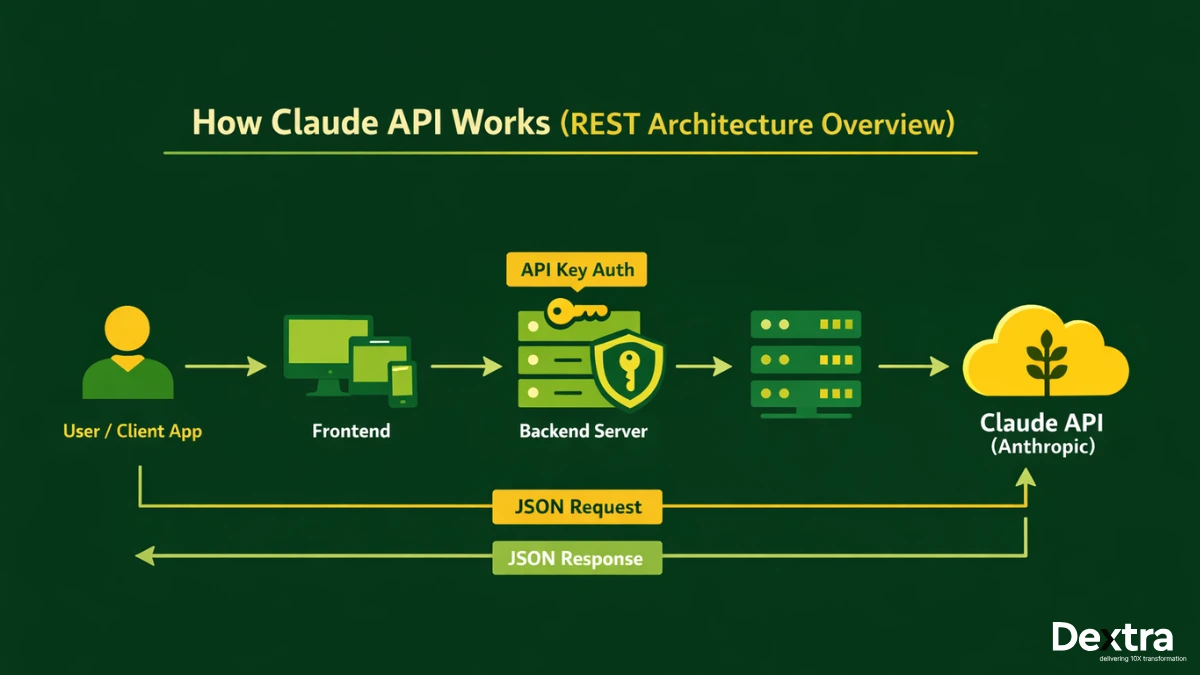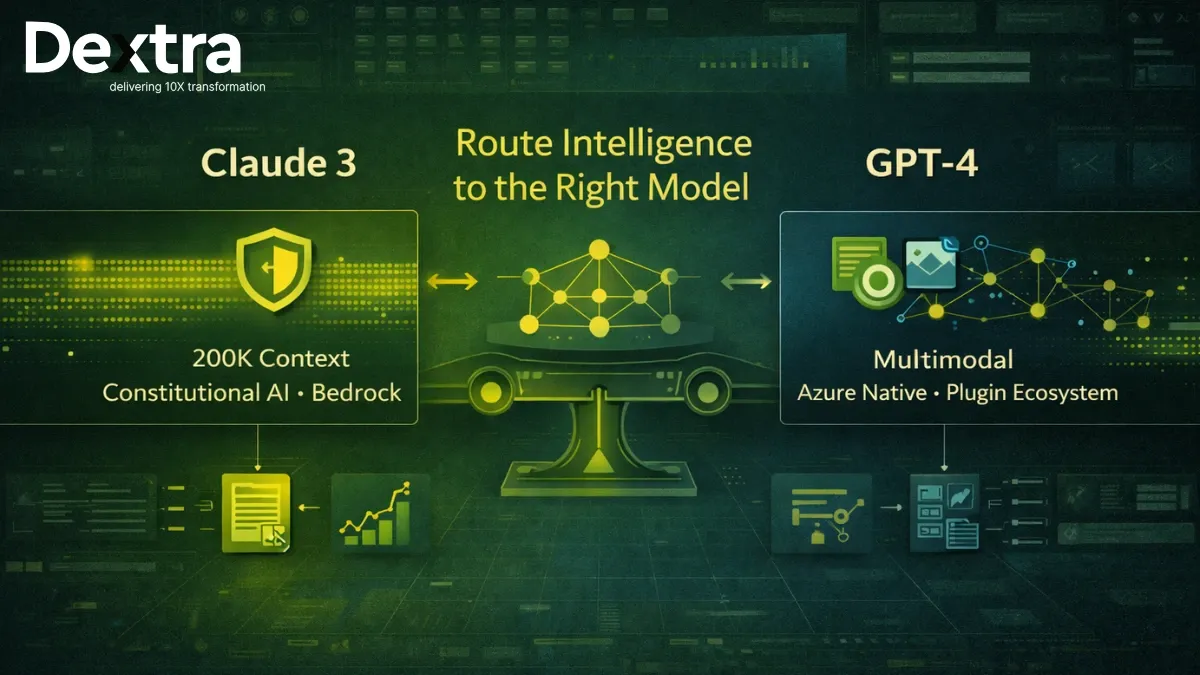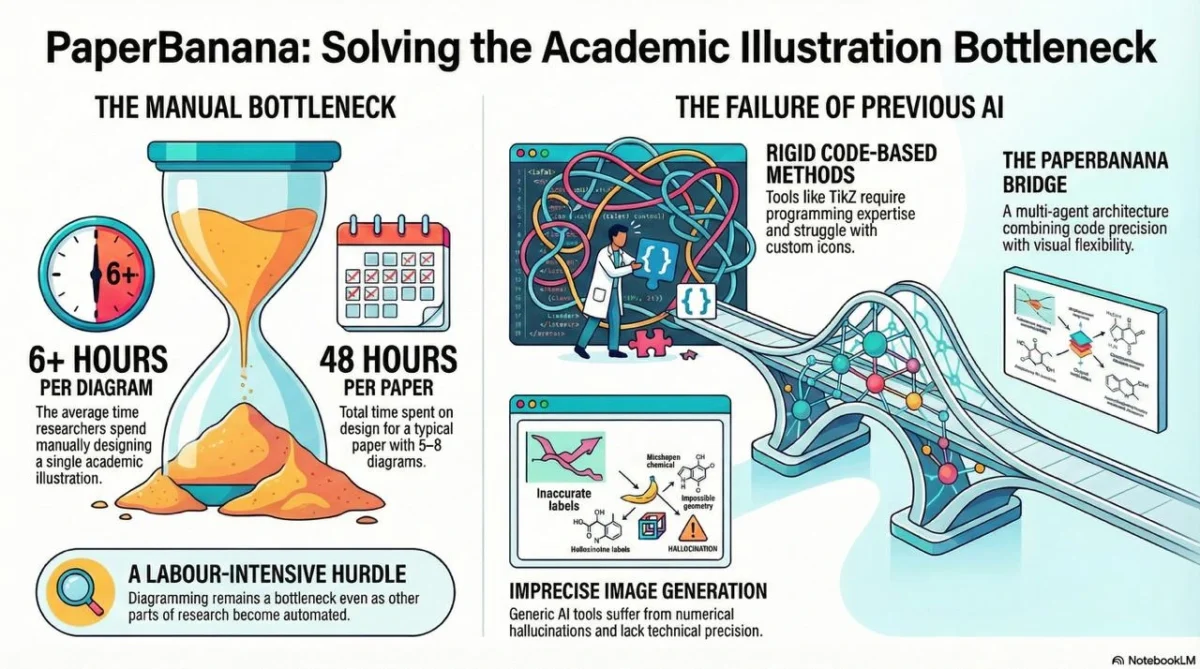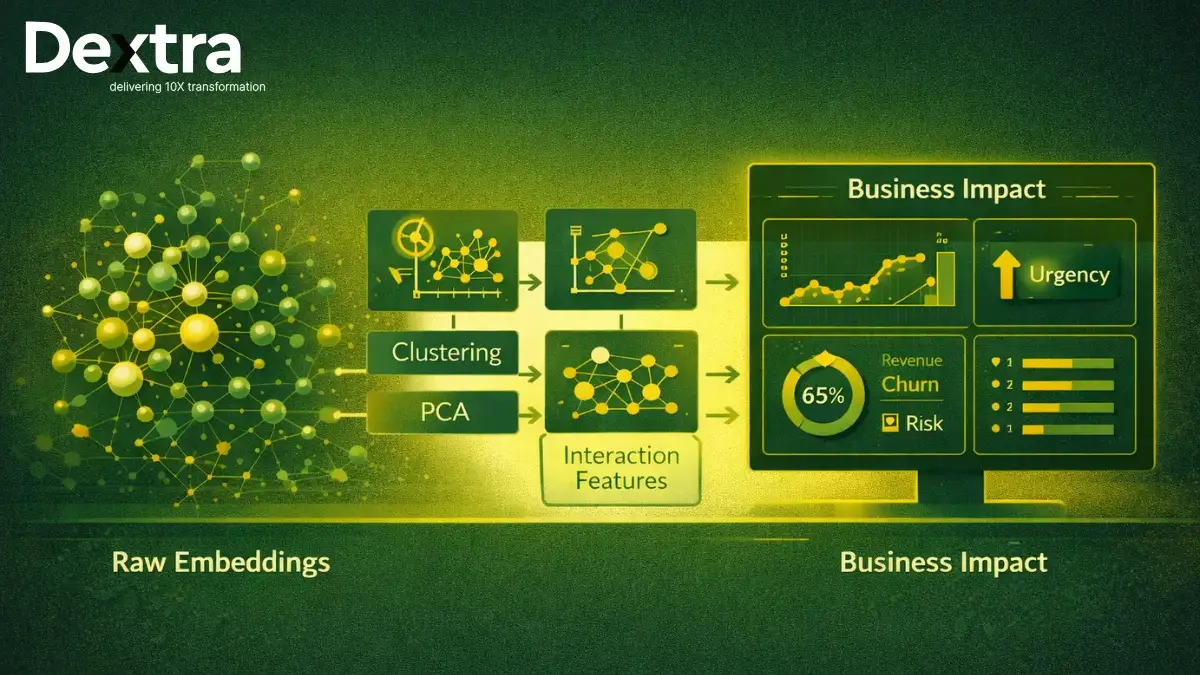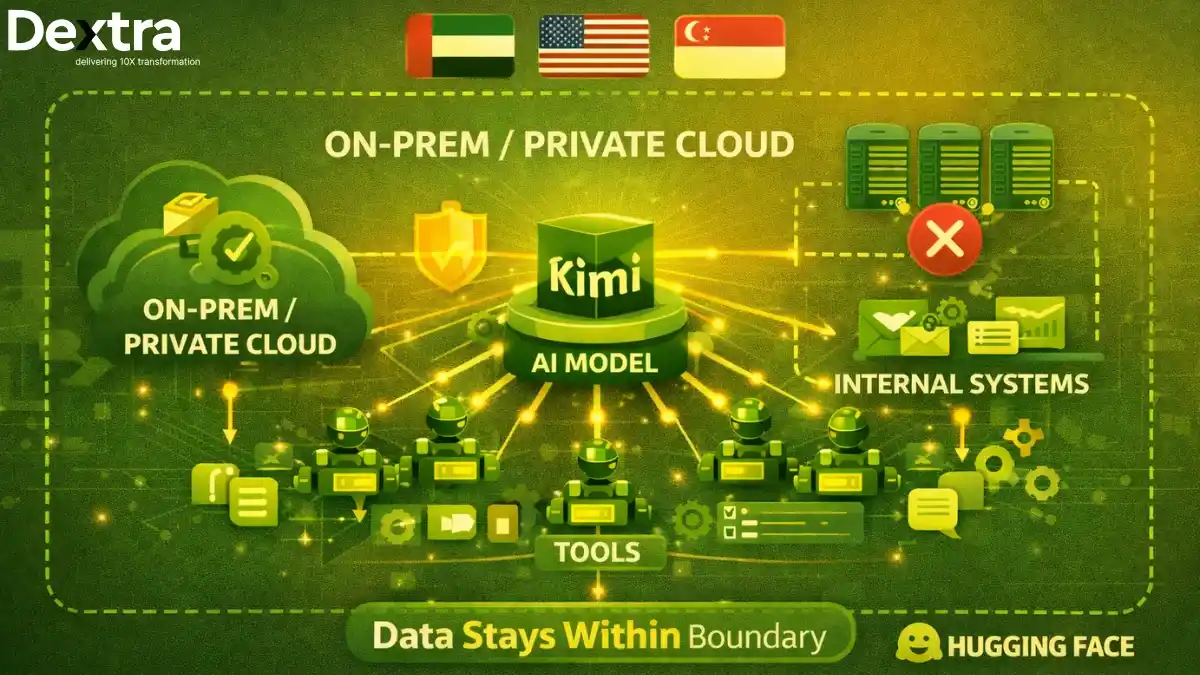Outdated codebases increasingly burden fast-growing startups and mid-sized tech firms. According to McKinsey, companies pay an additional 10 to 20 percent to address technical debt on top of project costs. IBM reports that maintenance of the current environment accounts for over 70% of the IT budget, leaving less than 30% available for new projects. Traditional refactoring methods are often risky, time-consuming, and expensive, diverting resources from innovation and growth.
AI-powered code refactoring offers a smarter solution. By leveraging machine learning trained on extensive code patterns, companies can modernize large codebases automatically faster, safer, and more cost-effectively.
Dextralabs, a global AI consultancy, assists companies across the USA, UAE, and Singapore in transforming their software systems through automated refactoring solutions, turning legacy technology into high-performing, scalable infrastructure without the chaos of traditional rewrites.
Modernize Without the Mayhem
Refactor your legacy code safely with Dextralabs — your trusted AI-powered transformation partner.
Book a Free ConsultationWhat Is AI-Powered Code Refactoring?
AI-powered code refactoring uses machine learning and artificial intelligence tools to automatically analyze, restructure, and optimize existing codebases without changing the software’s external behavior. Unlike traditional manual refactoring, which is time-consuming and prone to human error, AI-driven refactoring uses pattern recognition, dependency analysis, and best-practice models to refactor code efficiently, at scale, and with reduced risk.
Modern AI development tools and AI coding assistants play a vital role in this process. These tools can identify code smells, redundant logic, outdated syntax, and inefficiencies across thousands of lines of code.
They then recommend or automatically apply fixes based on clean code principles and the latest language standards. This allows development teams to maintain agility, reduce technical debt, and free up time for building new features.
AI code refactor solutions are especially effective across popular frameworks and languages such as:
- Golang – Improving concurrency handling and modularization
- React & TypeScript – Optimizing component structure and state management
- Java & Python – Enhancing readability, performance, and dependency injection
- Node.js – Streamlining asynchronous code and API interactions
Whether you’re working on monolith-to-microservices migration or cleaning up a startup’s MVP, AI refactoring brings speed, accuracy, and scalability to software modernization.
When and Why You Need to Refactor Legacy Systems?
Legacy systems may have once powered innovation, but over time they can become roadblocks to speed, scalability, and security. Recognizing when to refactor and how to do it safely is critical for maintaining software that grows with your business.
Signs your legacy app needs refactoring
- Performance Lags – The system slows down under load or struggles with responsiveness.
- Code Complexity – Difficult to read, understand, or modify, especially for new developers.
- Framework Obsolescence – Built on outdated or unsupported frameworks and libraries.
- High Technical Debt – Frequent bugs, hotfixes, and growing maintenance costs.
Risks of Manual Refactoring
- Breaking Things – Manual updates can accidentally disrupt core functionality.
- Time-Intensive – Refactoring manually takes longer and requires more testing resources.
- Limited Scalability – Harder to future-proof your application without structured upgrades.
Benefits of AI-Powered Legacy Code Refactoring:
- Automated Code Quality – AI tools improve structure, readability, and maintainability.
- Faster Refactoring – Quickly modernize large codebases with minimal manual effort.
- Smart Pattern Detection – AI identifies inefficiencies and suggests optimized code.
- Safe Upgrades – Reduce the risk of regressions and breakages during the refactoring process.
Also Read: Framework Migration with AI: How Startups Can Move from Legacy to Modern Tech Stacks Faster
How AI Actually Helps in Refactoring?
Modern AI code refactoring tools go beyond simple linting, they provide intelligent, automated support across the entire refactoring process:
| AIRefactoring Feature | Description |
| Code Analysis | Detects bottlenecks, dead code, and anti-patterns automatically, identifying areas with high technical debt. |
| Automated Suggestions | Provides AI-generated improvement snippets, offering smarter, more efficient ways to refactor code. |
| Transformation Assistance | Assists in migrating logic from legacy frameworks to modern stacks (e.g., AngularJS to React, Java to Kotlin). |
| AI-Powered Testing & Maintenance | Automates regression testing, code formatting, dependency updates, and version alignment to ensure consistent quality. |
Dextralabs Use Cases: AI Code Upgrades Done Right
Dextralabs has helped numerous companies streamline their codebases with AI-powered refactoring solutions. Here are a couple of real-world examples showcasing how our intelligent approach transforms legacy systems into scalable, high-performance infrastructures.
Case Study 1: Migrating from Java Spring to Node.js at a Fintech Startup (USA)
A rapidly growing fintech startup in the USA was struggling with an outdated Java Spring framework. They needed a solution to migrate their backend system to Node.js for better scalability and performance. With AI-powered code refactoring from Dextralabs, the team was able to:
- Automate the migration of business logic and data models to Node.js.
- Minimize manual errors and reduce development time by 40%.
- Ensure seamless transition with automated testing and monitoring.
Case Study 2: Cleaning Up Legacy PHP Code for a Healthcare SaaS (Singapore)
A healthcare SaaS provider in Singapore was facing issues with their aging PHP codebase, which had accumulated technical debt and inefficiencies over time. Dextralabs used AI-driven refactoring to:
- Identify anti-patterns and refactor complex code segments.
- Provide AI-powered suggestions to streamline code for better maintainability.
- Enhance system stability with thorough regression testing and minimal downtime.
Best AI Tools & Practices for Code Refactoring
AI-powered tools are revolutionizing the way developers approach code refactoring, making it faster, safer, and more efficient. From Codex-based custom agents to popular third-party solutions like GitHub Copilot and Sourcery, these tools are designed to automate tedious tasks and improve code quality. Here’s a breakdown of the best AI tools and practices that streamline the refactoring process.
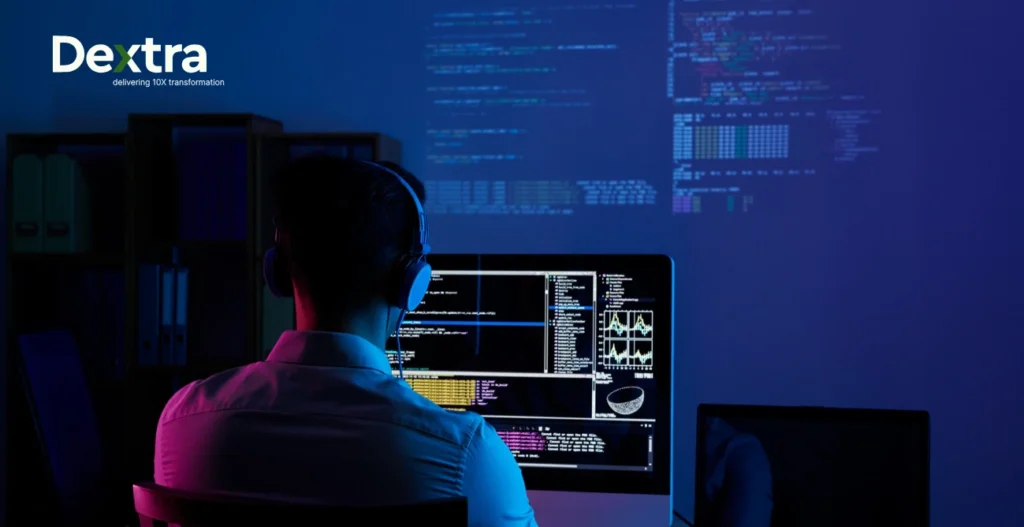
Overview of Tools for Automated Code Refactoring:
1. Dextralabs’ Codex-Based Custom Agents
Dextralabs leverages Codex-based custom agents to create tailored refactoring solutions for clients. These agents are trained on specific code patterns, making them highly efficient in recognizing bottlenecks, and anti-patterns, and providing real-time code suggestions for improvement.
2. GitHub Copilot
GitHub Copilot is a powerful AI assistant that suggests code snippets and entire functions, enhancing developer productivity. It integrates seamlessly with IDEs like VS Code, helping developers write better code faster.
3. Sourcery, Refact.ai, CodiumAI, and Others
These third-party automated code refactoring tools offer a variety of features, such as:
- Sourcery: Focuses on Python refactoring, providing suggestions for cleaner code.
- Refact.ai: An AI-driven tool to improve code readability, maintainability, and efficiency.
- CodiumAI: Helps in refactoring codebases across different languages, offering automated cleanups and enhancements.
Role of Agentic AI in Continuous Integration (CI) and CI/CD Pipelines
AI-driven tools play a crucial role in continuous integration and CI/CD pipelines by:
- Automating code refactoring during the development process, ensuring that code quality is maintained with every commit.
- Reducing human errors by offering automated suggestions and improvements, which seamlessly integrate with version control systems and CI/CD tools.
- Ensuring efficient scaling by automatically updating dependencies and refactoring code for high performance as part of the deployment process.
Benefits of AI-Powered Refactoring
AI-powered refactoring isn’t just about automation it’s about accelerating development while improving code quality. Here are the key benefits that make it a game-changer for modern software teams.
- Significant Time Savings: AI tools can reduce code audit and review time by up to 60%, speeding up delivery cycles and modernization efforts.
- Fewer Bugs and Rollbacks: Intelligent refactoring reduces human error, resulting in cleaner code with fewer post-deployment issues or production rollbacks.
- Improved Developer Focus: With routine cleanups and optimizations handled by AI, developers can concentrate on high-value features and innovation.
- Faster Onboarding for New Engineers: A cleaner, well-structured codebase helps new team members understand and contribute faster, improving team agility.
The Dextralabs Advantage
Why startups and CTOs across the USA, UAE, and Singapore trust Dextralabs:
- Deep AI + Dev Expertise
We combine cutting-edge AI capabilities with real-world software engineering experience to deliver intelligent, reliable code upgrades. - Proven Framework for Legacy Modernization
Our AI-based approach ensures fast, low-risk transformation of legacy systems into scalable, modern architectures. - Custom Agentic AI Models
We build tailored AI agents that analyze, refactor, and optimize your code for performance, maintainability, and future growth.
Let Dextralabs audit your codebase and deliver AI-powered upgrade paths designed for speed, stability, and scale.
Conclusion: Upgrade Smarter, Not Slower
Legacy systems often get labeled as roadblocks but with the right tools, they can become competitive advantages. Traditional refactoring methods are slow, expensive, and prone to errors, especially for startups and mid-sized firms trying to move fast. That’s where AI comes in. With intelligent code analysis, automated improvements, and safe migration paths, AI-powered refactoring transforms fragile, outdated codebases into agile, future-ready systems without chaos.
At Dextralabs, we bring together deep AI expertise and proven development practices to help companies modernize with confidence. From initial audits to custom agentic AI deployment and automated testing pipelines, our process ensures your transformation is smooth, efficient, and scalable. With us, you don’t just refactor, you evolve. Let Dextralabs guide your journey from legacy limitations to AI-driven excellence.
Upgrade Smarter, Not Harder
Let Dextralabs optimize your legacy systems with AI precision and zero downtime.
Book a Free ConsultationFAQs on Ai Code Refactoring:
Q. How can AI tools help to improve code by refactoring?
AI tools analyze large codebases to detect anti-patterns, redundant logic, and outdated dependencies. They then suggest or automatically apply improvements such as simplifying code, removing dead logic, optimizing performance, and aligning code with modern best practices all while maintaining the original functionality.
Q. In what ways does AI assist with code refactoring?
AI assists in multiple ways:
– Code analysis to find bottlenecks and complex structures
– Automated suggestions for cleaner, more maintainable code
– Migration support from old frameworks to newer ones
– Regression testing and dependency updates to ensure safe deployments
– This reduces manual effort while improving code quality and scalability.
Q. What are the main benefits of using AI for code refactoring?
Key benefits include:
– Time savings (up to 60% faster code audits)
– Reduced bugs and rollbacks due to precise automated changes
– Improved developer productivity, letting teams focus on innovation
– Easier onboarding with cleaner, well-structured codebases
Q. How do I know if my legacy codebase is suitable for AI-based refactoring?
If your codebase is older than 5 years, has frequent bugs, uses outdated frameworks (like AngularJS, Java Spring, etc.), or is hard to scale it’s an ideal candidate. AI tools can assess structure, complexity, and tech debt to suggest refactoring automatically.
Q. Can AI tools handle complex business logic or will we still need senior developers?
AI tools can assist in identifying repetitive patterns, outdated methods, and redundant code but complex business logic still requires human oversight. At Dextralabs, we use AI + expert consultation to ensure mission-critical logic remains intact.
Q. Will using AI reduce my development team’s workload or replace them?
AI doesn’t replace your team, it amplifies their productivity. Routine tasks like dependency updates, format corrections, and code suggestions are handled by AI so your developers can focus on strategic innovation.
Q. How long does an AI-powered code refactoring project typically take?
It depends on codebase size and quality. With AI acceleration, a project that would take 3–4 months manually can often be done in 4–6 weeks with Dextralabs’ AI-driven approach.
Q. What about data privacy and code security when using AI tools?
At Dextralabs, we use private and secure agentic AI systems, not public models. Your code never leaves your environment. We comply with GDPR and local regulations for data handling.
Q. Can AI help in upgrading from legacy frameworks (e.g., Java to Node.js)?
Yes. AI can analyze the old framework structure, identify mapping logic, and even recommend equivalent functions or libraries in the new tech stack. Dextralabs specializes in AI-assisted framework migration with minimal downtime.
Q. What’s the ROI of AI-based refactoring for mid-sized firms?
Reduced technical debt, faster deployments, fewer bugs, better developer retention. Many firms see a 30–50% improvement in release velocity and cost savings within the first year.

